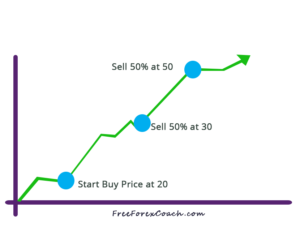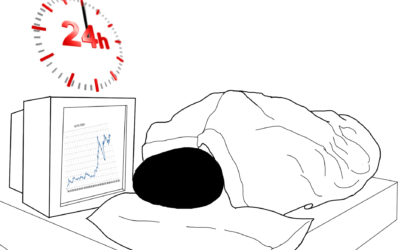Scaling in and out trades in Forex is a risk management technique that allows you to maximize potential profits and limit potential losses.

The aim of scaling in and out of trades in Forex is to realize as much profits as possible when the market moves to your favor and less loss when the market goes against you!
In the previous lessons of risk management, we have talked about;
- How to trade with leverage?
- The common mistakes you make when setting stop loss.
- How to calculate the right position size?
- Risk reward ratio
- And finally currency correlation.
When trading in Forex market, you should not only look at just having as many profitable trades as possible.
But instead aim maximizing profits and minimizing losses.
What is scaling in trades in forex
Scaling in, means increasing the number of lots in a position. In other wards, you add more positions in an open position.
You should scale in only when you feel confident that price will continue moving to your direction for a while.
However, this does not mean you increase the initial amount you intend to risk per trade. Never go against your rules.
To scale in on a position, you open a position with a fraction of just the amount you intend to risk.
When price moves to your favor enter more positions but all your positions should cover only your risk per trade.
Let’s say that you wished to enter into a trade with a standard lot, when you use scaling in you can enter your first trade with just a fraction of the standard lot.
By breaking down this position into mini lots, you reduce the total risk. You will lose less if the trade does not work out compared to if you entered with a full standard lot.
After your first entry, if the trade starts to go in your favor, you can add another position or more at different levels according to your confidence.
You can do this until your size totals up to a standard lot as long as the trade continues to move in your favor.
But as you trail your stop, you can add more positions knowing the locked profits cater for the new risk/open position added.
All in all make sure your open positions total risk is per your trading rules.
What is scaling out
Scaling out is to reduce the number of lots in a position. Or the closing out some of the open positions as price momentum fades.
Unlike scaling in where you add new positions in a trade, with scaling out you close and take profit on some positions and leave other positions running.
For example, let’s say you have a total position of one standard lot in the market.
Suppose your trade is almost taking profit but you think the trend is likely to continue for some time in your favor.
You can close some open positions to take profit and leave others running to take advantage of the further anticipated price movement.
To do this, you will need a trailing stop.
With a trailing stop, you move your stop loss in the direction of your trade. This helps you to lock in some of your already made profits as you leave the trade to continue running.
Alternatively, partial close your trade. Reduce on the size of your position size.
Double click on the order or (Right click on <Close trade>, then change the amount of your position size).
For example;
If your size is 5, and you want to close your trade half-way;
Change your position size to 2.5 and click on <CLOSE>.
Your trade automatically closes partially by 2.5 and continues to run with a size of 2.5.
You can continue reducing your size till you decide to take profit or close the trade completely.
Entering the market in fractions and exiting trades in fractions does not only increase on your profits but also reduces on losses.
This is because the already made profits are locked in, leaving other positions to take advantage of further price runs.
How long should you hold an Open Position ?
How long you can hold an open position in forex, is a personal thing for all traders. The decision is all yours. You know what your goals are as a trader, the kind of strategy you use to trade. All this starts from what you are? and What you want? If I am to answer,...
- Oh, bother! No topics were found here.



